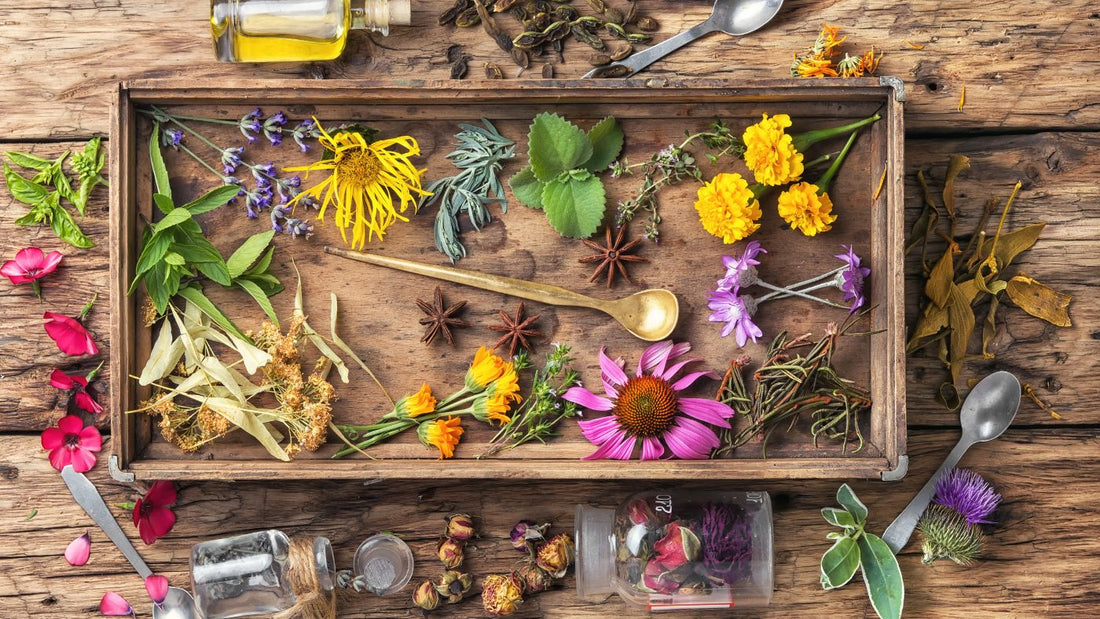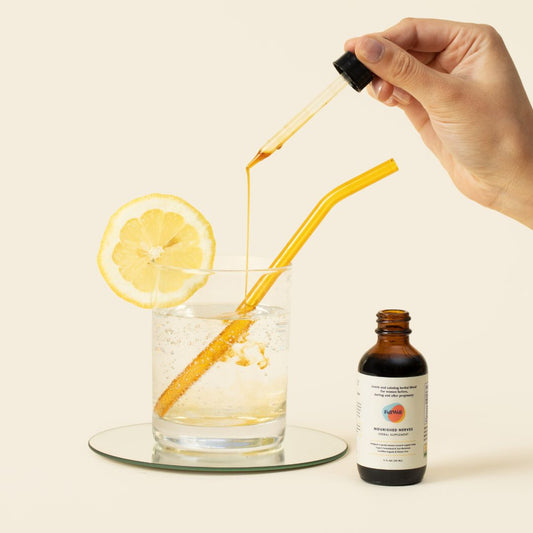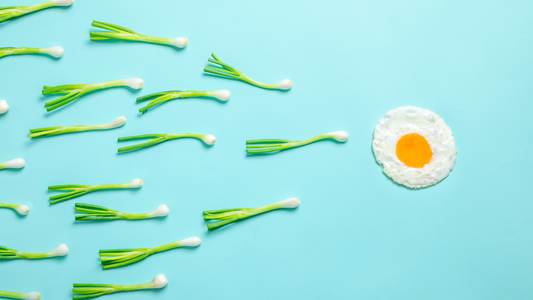Postpartum Nutrition with Allegra Gast, RDN
Read more

As a registered dietitian, I have put years of study, certification, and continuing education into my private practice and formulation of FullWell Prenatal. And while much of my work involves addressing nutrition with natural, whole foods and appropriate supplementation, I also have a background in herbalism. I believe that the benefits of medical plants are endless and fascinating (not to mention science-backed) and that many women who are trying to conceive, pregnant, or breastfeeding stand to gain a lot by implementing them into their routines.
This means doing the same intensive research for the herbs you consume for your food and supplements. For many of us, herbs only cross our minds when we are perusing the tea aisle in the grocery store or sprinkling a dried powder into a recipe. In these situations, the importance of herbs lies with sneaky marketing (e.g., teas of questionable quality promising to change your life) or simply with their flavor. Herbal health benefits often take a back seat. However, I usually recommend many types of herbal concoctions to help support you during your preconception, pregnancy, and postpartum.
An action formula is an intentional utilization of an herb or combination of herbs that balance traditional herbal energetics with clinical actions. The goal is to create a formula tailored to your constitution that also takes on whatever condition you want to support.
A lot of marketing for herbal products tends to push what some might refer to as a “kitchen sink” formula that throws together a bunch of “good for [insert condition here]” herbs to sell as a cure-all. There are two significant issues with this.
There are only a few significant missteps you can make regarding herbs: 1) taking something new without doing your research (which I know you won’t do!), and 2) omitting your herb usage with your healthcare provider. Does your provider double as a passionate, well-versed herbalist as I do? Probably not. But they need to know everything you are consuming - from food and traditional supplements to medications and herbal supplements - to monitor how these things support you and interact with each other.
One of the most significant issues with herbal medicine is that it is thought of entirely separately from other, more traditional forms of health care. Many women don’t tell their doctors that they are using herbs. Conversations with your provider should be candid. When in doubt about whether or not something is safe or effective, always ask questions before using herbal teas, infusions, or tinctures. If your provider offers a blanket dismissal of all herbal products, consider consulting with another provider trained in herbalism. There is usually no reason to avoid them entirely.
These words are sometimes muddled interchangeably in marketing, but think of the differences here in terms of herbal concentration:
Small amounts of herb(s) steep in water in open air, usually for short amounts of time (~5 minutes).
Large amounts of herb(s) steep in hot or cold water in an air-tight container for hours or overnight for a more concentrated solution.
An ultra-concentrated herbal extract, diluted before consumption.
There are a whole host of approved herbs that can help support every stage of pregnancy. Here are the eleven herbs to know:
Chamomile is commonly used in hydrating, calming teas that can help support a healthy night’s sleep, which is why I chose to include it in our Nourished Nerves formula. It is also great for supporting digestion, maintaining healthy muscle function, relaxed nerves, and appetite. It contains powerful antioxidants and anti-inflammatory properties and significant calcium and magnesium. Cover and steep in hot water for five minutes for a soothing tea. It can be sipped in the evening to help you sleep or sipped during the day as a general tonic.
Dandelion leaves and roots contain a whole host of vitamins and minerals, including potassium, calcium, magnesium, vitamins A, C, D, and B, and most notably, iron. This iron tonic from Aviva Romm, MD, is one of my go-to's in my private practice for my iron-deficient clients who are bordering on anemia. (Check out my latest article on lab work for iron levels here.) Additionally, dandelion has been said to support digestive health throughout and particularly during early pregnancy. It is also commonly believed that it can support healthy lactation after pregnancy. Dandelion root can be taken as an infusion or a tincture, while the leaves can be sautéed with lemon and garlic for a savory side dish.
If you're worried about catching a cold or getting the flu during pregnancy, echinacea is here to help support your immune system. Over-the-counter echinacea products can be found at your local pharmacy and in immune-supporting teas at your grocery store. A number of studies have looked at using echinacea during pregnancy, and it has been shown to be safe through all trimesters.
Ginger is one of my absolute top morning sickness saviors from personal experience. Throughout my own pregnancy, it was not uncommon to find me gnawing on hunks of raw ginger to keep my nausea at bay. It has a warming, calming effect, so I formulated it into our Nourished Nerves tincture. I highly recommend organic ginger products for any pregnant woman. I have a quick recipe for a fresh, delicious ginger juice that doubles as an excellent anti-inflammatory posted on my Instagram.
Lemon balm is a member of the mint family, serving as a gentle and calming herb that helps support the nervous system. It's traditionally been used for centuries to support cognitive function, and recent clinical studies have validated its many uses, including its role in supporting mood and relaxation.
Linden is one of the most gentle herbs that can be utilized for its sedative properties which can help support rest, mood, and overall relaxation. Studies show that it promotes relaxation by mimicking the activity of gamma-aminobutyric acid (GABA), a neurotransmitter that boosts mood and has a relaxing effect on the nervous system.
Oat straw comes from the stems and leaves of the same plant as the oats we eat for breakfast. It’s a deeply nourishing herb and one of the best for nervous system support, helping to promote relaxed nerves and muscle functioning. Just a cup of an oat straw infusion contains ample amounts of calcium, magnesium, and silica, a trace mineral that promotes collagen production. Oat straw and milky oat tops are utilized in our Nourished Nerves tincture to help support mood and overall relaxation. Try making it as an infusion, adding it to a smoothie, or using both oatmeal and oat straw to make a soothing herbal bath. It’s an excellent emollient that helps moisten the skin and can even be used on diaper rash for baby postpartum.
Red raspberry leaf ramps up your B vitamin and vitamin C intake and packs high amounts of magnesium and potassium, which can help support your energy levels. While some studies show these leaves can support symptoms of PMS, for pregnant women in their second and third trimesters, a compound found in red raspberry leaves can maintain healthy pelvic muscles and the walls of the uterus, thereby supporting your delivery. This isn’t an old wives tale: one study showed that those who drank red raspberry leaf tea in the last stage of pregnancy found that it supported a more manageable first stage of labor. There is sometimes a fear of red raspberry leaf due to its affinity to the uterus. However, this nutritive herb is very safe.
Spearmint contains chemical compounds that support the body’s free radical defenses and slows the oxidation process. In supporting healthy menstrual cycles, spearmint is also thought to stimulate the release of eggs, signaling a fertility component. Spearmint tea is also a great way to support healthy digestion.
Stinging Nettle, one of my personal favorites, is a nutritional powerhouse. The tea is made from the leaves and roots of the stinging nettle plant and is rich in vitamins A, D, E, and K, high in calcium, iron, and magnesium, and helps support mood and relaxation, which can be helpful postpartum. It’s also a natural antihistamine to support those that struggle with seasonal allergies. Dried nettles can be steeped on their own for five to twenty minutes with water that has reached a rolling boil. You can also steep it at room temperature overnight for a potent tonic. Fresh nettles are great for infusions but are unique in that they can be used as superfood medicine, cooked like you would any other green. Stir it into soups or broths, scramble it into eggs, or bake it in savory dishes with other tender herbs. My personal favorite involves blending it raw with olive oil, garlic, parmesan, and pine nuts to make a nettle pesto! Just note that if you are working with fresh nettles, you will need to wear gloves until they are cooked or dried because this herb has a stinging property that is harmless but unpleasant on bare skin. Don’t worry: blanching, cooking, and drying all nullify this property!
Yellow dock is an abundant wild weed and one of the best herbs for the digestive system and liver. It’s great for supporting regular bowel movements and helps stimulate the liver to make iron more available throughout the body. The root is typically used as an herbal remedy and has a somewhat bitter taste, so it’s best consumed as an infusion or syrup with other more flavorful herbs.

Weaning yourself off caffeine and the daily treat of coffee or stimulant-heavy tea can be challenging. Not everyone needs to cut out caffeine when trying to conceive, pregnant completely, or breastfeeding, but most at least find they need to decrease it to some degree to feel their best. Utilizing what you now know about dandelion root in this coffee stand-in recipe can help you keep your morning ritual while easing your body into its new caffeine-free regimen, and adding Nourished Nerves to tea or golden milk can serve as a lovely morning treat to help support your nervous system for the day ahead.
Mountain Rose makes a fantastic loose-leaf Organic Fecundi Tea with organic spearmint, lemon balm, nettle leaf, dandelion leaf, red raspberry leaf, oat straw, alfalfa, ginger, and lemon peel. Mountain Rose is an excellent source of consumer information in general, so I recommend checking out their blog if you’re interested in trying to create your own action formulas using their products. I highly suggest pairing their loose-leaf products with our Nourished Nerves formula for a massive bang for your buck in a single cup. Not only can that combo support your mood and overall relaxation, but it can also encourage a peaceful slumber as your body changes, and it becomes harder to get comfortable.
Remember that recipes aren’t just for creating foods and beverages. Homemade personal care products like this organic nipple cream can come in handy and have the added benefit of safety since you hand-selected the ingredients. Just like with your nutrition, making personal care products yourself allows you to rest assured knowing exactly what went into them. Exercising control over your health is empowering! Taking a deeper look into concocting your homemade personal care products is a great way to eliminate hormone-disrupting chemicals from your daily routine, no matter what stage of your pregnancy journey. Pro tip: make products during your 3rd trimester to have for postpartum. If stored properly, they can last for months.
Men’s health is just as important as yours, especially regarding fertility, so creating a nutritional baseline with our Men's Multivitamin is critical. Understanding which herbs benefit men’s health is essential for your partner.
